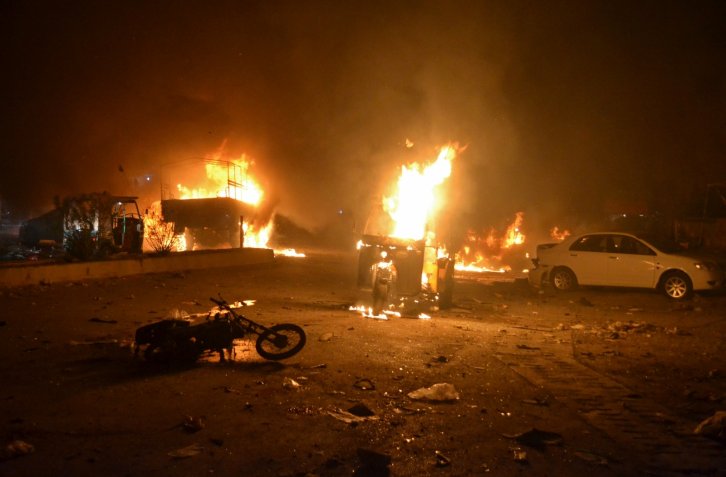Image of vehicles burning in aftermath of Saturday’s bomb attack in Quetta.
At least 15 people, mostly military men, were martyred and dozens wounded – some of them critically – in a terrorist attack targeting an army truck
in a high-security neighbourhood of Quetta, Baluchistan on Saturday night (12th August). Followed by a further bomb attack on Monday (14th August)
in a remote district of Baluchistan in south western Pakistan, that killed eight soldiers.
15 casualties, and dozens wounded. Ten vehicles were scorched and gutted from the force of the explosion.
were left wounded – some critically.
blast of flames engulfed not only the truck but several other vehicles driving by in the ensuing a ball of flames, including: Four cars, four auto-rickshaws
and two motorcycles.
packed with ball bearings to inflict maximum casualties.
in Pakistan claimed responsibility for the attack.
for vital forensic evidence.
High Court. This high-security zone is also a busy shopping district filled with hotels and restaurants and shops
Monday’s attack followed a different modus operandi after a roadside bomb detonated and killed 8 soldiers.The separatist organisation ‘Baloch Liberation
Army’ (BLA) have already claimed responsibility for the attack.
Concerns have been raised about growing militancy in the state of Baluchistan which is a recognisable stronghold for supporters of IS in Pakistan
and has suffered decades of insurgency from Baluch freedom fighters. Freedom fighters claim that Baluchistan was sequestered by Pakistan under
duress after having been offered statehood by the British Raj. The main proponents for freedom have also been calling for a greater share
of the gas-rich resources from the province which is also a major route for the ‘Belt and Bridges’ economic corridor programme funded to the extent
of $57 billion by the Chinese.
Wilson Chowdhry, Chairman of the British Pakistani Christian Association, said:
“The frequency of bomb attacks in Pakistan in recent months is at an all time high. There have been at least 12 terrorists attacks this year which is devastating communities and causing a huge loss of morale.
“This attack only days before the 70th anniversary of Pakistan is clear evidence that the country is in a period of turmoil with militants intent on causing fear and anxiety. 70 years of Pakistani nationhood has done little to quell social disunity and has in fact only served to exacerbate polarisation and conflict.
“Tribal and religious differences and social inequality have created a cancerous social climate in Pakistan a product of poor governance. Devolved provincial national curriculum that inculcates stereotyping and demonization of ‘others’ has fermented the hate and cemented differences.
“Unless the Government of Pakistan is serious about addressing these issues the existing fractious society will continue to worsen leading to a failed state in anarchy. This is especially dangerous in Pakistan’s case as it is a nuclear power.”
